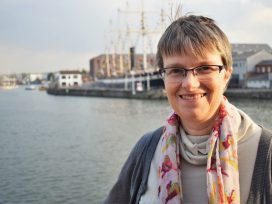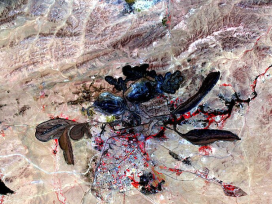Almantas Samalavicius: The project of modernity was largely a preoccupation with total homogenous projects in almost every sphere of human activity, including economics. All of the applications of economics were designed to fit everywhere and everyone. They were imagined to be universal. However, you strongly insist on local or regional economic solutions. How did you arrive at this idea and develop it into bioregional economics?
Molly Scott Cato: My ideas were developed during years of activism in the British Green Party where a different culture to the predominant globalist thinking was shared. The idea that a green economy would be based around a system of self-reliant local economies was the common currency of conversations, but the local economy was not well defined.
After I had written my Green Economics book it became clear to me that we needed to answer the question “How large is a local economy” and I came across the idea of the bioregion and thought it might provide an answer. At that stage it was about finding areas small enough for people to take responsibility for their environmental behaviour and be accountable for it; this is difficult on a global basis, allowing people to say “Why shouldn’t I fly when they build a new power station in China every week?” and so on.
What I didn’t realize about the bioregion is that it actually provides a different sort of identity that can act as a substitute for the high-energy global consumer identity that people have today. It offers a sense of “local patriotism” that I think can help us move towards a lower-energy system of provisioning.

AS: Many people in Europe and perhaps all over the world still think that notions like “green economics” and the like are surely “nice” but hardly possible, perhaps even utopian. You treat the issue of utopianism in your latest book as well and suggest that utopia has its own uses – triggering our imagination to attain things that are possible (though I would in this context use the term “eutopian” instead of “utopian”). Where does the border lie between fantasy and reality regarding local economies and economic concepts? Because the growing environmental crisis seems to urge us all to rethink previously dominant concepts and ideas. Or to put it more bluntly, how can one persuade people that the time has come to abandon the dominant mainstream theories of economy, often framed as fabulous “free market” miracles? And that simply abandoning these would in fact be far more utopian than any sound arguments against them?
MSC: Karl Polanyi, an economist I rely on heavily in my work, characterized the market economy as a ‘utopian endeavour’ and I agree with him. The idea that by doing nothing and letting everybody behave as selfishly as they like we can arrive at an ideal world is a childish theory and what happens when it is allowed to dominate is clear all around us: massive global inequality, devastated environments, and unhappy people. I see my role as imagining ideal futures: since human culture helps support belief in the possibility of something different, this is the vital first stage in making it possible. Human beings have lived for thousands of years in balance with nature and meeting their needs from the local land. It is the industrial market system that has destroyed this balanced relationship. So which is more fanciful: believing in the magic of the market or the possibility of local resilient economies?
AS: In your recent book you closely examine the failure of Iceland where ideas of neoliberalism and the privatization of the two major state-owned banks have ended in total economic disaster. What are the lessons to be drawn from the example of Iceland – a small fortress on the outskirts of Europe? Do you think that any of the “lessons” were learned in other parts of Europe?
MSC: The main lesson I draw from Iceland is that the real wealth of any nation is its natural wealth. Iceland was aiming for self-sufficiency, growing its own food in most inhospitable conditions, using the benefits of its geothermal energy. Then a generation of “Viking raiders” trained in US economics and focused on financial profits took control of the country and destroyed it. At the peak, the financial value of Iceland was eleven times its national product. This sort of pyramid system is grossly unstable, as the Icelandic default demonstrated. Since the crisis the Icelandic people have rejected this financial fantasy and there is a lesson there too: since its default Iceland has flourished. This is probably not a lesson larger countries can follow, however, because they have a structural role in the global financial system that Iceland did not because it was so small. It might work in a Baltic state but it would not work in the UK or France. I hope the Greeks will learn some lessons from Iceland since in a way they are in a stronger negotiating position. Remember the old adage: if you owe £10,000 the bank owns you; if you owe a million you own the bank!
AS: Like other economists I interviewed previously you insist that “economic history has been largely eliminated from university curricula and from funded research”. Moreover, even serious local economic thinking on non-Western societies is often treated by professional academic economists as a kind of “witchcraft” that hardly deserves any serious study. Where are the sources of this mistrust of the wisdom embedded in human cultures? Why has the academy shut itself off from its own theoretical sources?
MSC: I see economics in the academy as a fig-leaf for a particular kind of politico-economic system that works in the interest of small and largely financial elites. They need some justification for the gross inequalities their system generates and economic theory offers them this. When compared with reality – whether historic or contemporary – this theory breaks down, and so those comparisons are not allowed to be made.
AS: Most governments all over the world are hypnotized by the concept of economic “growth”. Quite recently the new prime minister in my country, even before stepping into his office after new elections, spoke to the media about the urgent necessity of stimulating economic “growth”, despite the fact that he represents the so-called “Left”. Why is this ideology of growth so persistent and where does it lead our economies?
MSC: It is my view that capitalist economies have to grow or else they will fail. This relates to the central role played by inequality in providing a stimulus to individuals within the economy. It also relates to the need to accumulate capital and hence to produce a surplus to enable accumulation. These are features of this economic system. A balanced economy without growth would mean a lower material standard of living but better quality of life and, crucially, greater equality.
AS: The natural world is mostly eliminated in and by the concepts of mainstream economics. You claim that “non-rationalist societies that recognize their dependence on the natural world, but do not have the scientific understanding that permits an aspiration to control, are conscious of the importance of their relationship with the environment and the other species they share it with in one way we are not.” What do you think of the paradox that scientific thinking, which should give us more insight into our relationship with earth, biosphere and other forms of life, seems instead to undermine this kind of insight and even lead to its neglect. How can we make use of science to expand our present worldview, so that, moreover, climate change and related problems are perceived as challenging current human behaviour? Do you see any chance of joining up environmental consciousness, economic thinking and human activities?
MSC: This is an interesting paradox and is illustrated by the way those in the ecological movement have used science to alert the wider community to the ecological crisis and yet frequently believe that a deeper more spiritual commitment is necessary to resolve these issues. I think the problem is that our clever rational minds can convince us of all sorts of nonsense, especially if the alternative is to accept things we subconsciously find unpleasant, like a loss of status or actually any sort of fundamental change. The most salient characteristic of contemporary public policy-making is denial, which in itself demonstrates that human beings do not act rationally. We also see the psychological rather than scientific response of displacement activity, so attempts to price nature feel like doing something – as opposed to accepting that nature is invaluable, which feels like doing nothing. The answer to this is to reground people in real relationships with other people, other species and the natural world. This real experience can help to counteract our delusions of grandeur when it comes to our ability to act scientifically and rationally.
AS: People in the Northern (or western hemisphere) are usually proud of their achievements, of their ideology of liberal democracy, humanitarian aid, etc. (Who would dare to say that this is not a progressive set of ideas?) However, most of us pursue patterns of consumption that threaten the survival of the whole world. In your book you speak about our attitude toward food being shipped all over the world. Meanwhile we could be fully satisfied with regional agricultural goods. To what degree can the bioregional approach to economics challenge the present levels of consumption and its consequences?
MSC: It is important for an academic who challenges economic growth to acknowledge the extraordinary advances it has brought, in terms of liberation from disease and hunger, and the flourishing of culture. But I believe that we have lost sight of what is meant by the good life and in its place we have adopted an addictive attitude of always wanting more. An important task is to learn to flourish within limits and I think the bioregion is a suitably sized area for us to understand its limits and learn to maximize human welfare within them.
AS: In your book you present a critical attitude toward specialization and specialist mentality and suggest one should take an interdisciplinary approach. However, despite popular talk of the urgency of crossing disciplinary boundaries, there are few attempts to design interdisciplinary programs and (at least from what I observe) academic communities feel much more comfortable within their narrow specializations. What could be done to help economics escape the vicious circle of professionalism and specialization? Can critique from outside be of any help? Or should we wait until a critical mass of dissenters break out of the “iron cage” of neoclassical economic thinking?
MSC: I notice that the number of economists critical of neoclassical theory is growing and we are something of a global movement now. Inside the academy the discipline of economics is withering and dying because students see it as irrelevant and so do not choose to study it. It still has some mesmerizing power on politicians – because it offers them the fig-leaf I described above – but my hope is that we will use the academic freedom that our universities still subscribe to and build a movement for pluralism in economics education to replace the outdated orthodoxy of the neoclassical paradigm.








